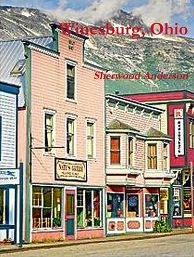Sherwood Anderson: ‘He is a nice fellow. We will let him down easy but let's can him.’ (Photo: The Sherwood Anderson Collection, Virginia Tech)How To Quit Your Job In Style
The day Sherwood Anderson chucked it…
Sherwood Anderson's path to literary immortality was fraught with false starts and no small amount of pain he inflicted on himself and his loved ones. Born September 13, 1876, in Camden, Ohio, and raised in Clyde, Ohio, he worked various odd jobs as a youngster, eventually leaving formal schooling at age 14. He then moved to Chicago, where his brother Karl lived, and worked as a manual laborer before enlisting in the Army. Leaving the Army after the Spanish-American War in 1900, he enrolled at Wittenberg University in Springfield, Ohio. From there it was back to Chicago, where he landed jobs first in a warehouse and then as a copywriter. (During this time he was also robbed, attended night school and had numerous love affairs.)
He married into wealth in 1904 when he wed Cornelia Lane, by whom he had three children while living in Cleveland and later Elyria, Ohio. In Elyria he managed a mail-order business and a paint manufacturing firm (Anderson Manufacturing Co.). In November 1912 Anderson was shaken by a cataclysmic event when he suffered a mental breakdown and disappeared. Four days later he turned up in a drugstore in Cleveland, apparently having walked some thirty miles to get there. Upon returning home, Anderson, seized by a desire to escape his "materialistic existence," abruptly left his wife and children in order to pursue an artist's life.
His next stop was Chicago, where certain realities took hold and he accepted a job as a copywriter at the Taylor Critchfield Co. advertising agency. During this time he published his first two novels, Windy McPherson's Son (1918) and Marching Men (1917), as part of a three-book deal with John Lane Company in New York. (He had written the latter novel as a hobby project while still living in Ohio.) In 1918, at age 41, existential angst visited again, and Anderson resigned his copywriter's job to devote his full energies to being a writer. He left the Critchfield Co. with a flourish, though, sending the following letter of resignation to his boss, Bayard Barton.
Chicago
June 25, 1918Dear Barton:
You have a man in your employ that I have thought for a long time should be fired. I refer to Sherwood Anderson. He is a fellow of a good deal of ability, but for a long time I have been convinced that his heart is not in his work.
There is no question but that this man Anderson has in some ways been an ornament to our organization. His hair, for one thing being long and mussy gives an artistic carelessness to his personal appearance that somewhat impresses such men as Frank Lloyd Wright and Mr. Curtenius of Kalamazoo when they come into the office.
But Anderson is not really productive. As I have said his heart is not in his work. I think he should be fired and if you will not do the job I should like permission to fire him myself. I therefore suggest that Anderson be asked to sever his connections with the Company on August 1st. He is a nice fellow. We will let him down easy but let's can him.
Respectfully submitted,
Sherwood Anderson
A year later Anderson published his short story cycle Winesburg, Ohio. Despite mixed critical reception upon publication, and a diminished reputation in the 1930s, in time the book gained enthusiastic adherents for its incisive portrait of small-town life in pre-industrial America, and has been cited as influencing Hemingway, Salinger, Faulkner and Steinbeck, among other famous authors who emerged after Anderson. In 1998 Winesburg, Ohio was named by the Modern Library as 24th on its list of the 100 best English-language novels of the 20th Century.
Sherwood Anderson’s Winesburg, Ohio is available at www.amzon.com
Founder/Publisher/Editor: David McGee
Contributing Editors: Billy Altman, Laura Fissinger, Christopher Hill, Derk Richardson
Logo Design: John Mendelsohn (www.johnmendelsohn.com)
Website Design: Kieran McGee (www.kieranmcgee.com)
Staff Photographers: Audrey Harrod (Louisville, KY; www.flickr.com/audreyharrod), Alicia Zappier (New York)
E-mail: thebluegrassspecial@gmail.com
Mailing Address: David McGee, 201 W. 85 St.—5B, New York, NY 10024




